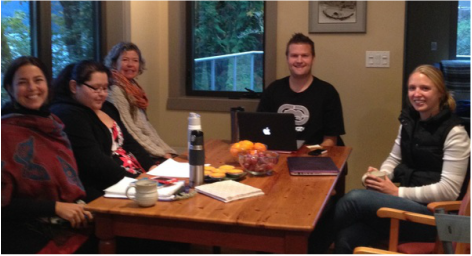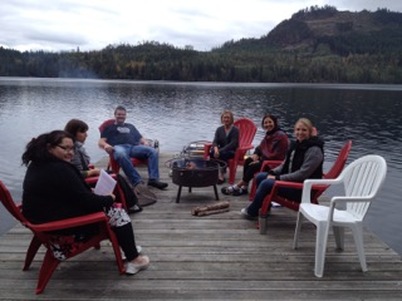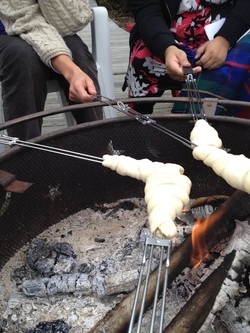Social Justice
 Credit: Linda McDaniel
Credit: Linda McDaniel
For our last inquiry, we studied Social Justice Issues. From my colleagues, I learned about:
- poverty,
- sexualization in the media,
- discrimination (gender),
- mental health disorders (anxiety and PTSD),
- the guidelines for inclusion regarding Christmas and other cultural/religious holidays.
 Credit: Linda McDaniel
Credit: Linda McDaniel
For my inquiry project on Social Justice, I chose to role-model thinking outside the box and risk-taking: I took a different look at Nature Deficit Disorder and chose to learn from nature instead of learning from literature. I was interested in questioning the taken-for-granted cultural assumptions that keep us separate from nature, especially the ones embedded in the education system. I had already read a lot about this in the past, but I was interested in finding a way to present this information to my colleagues in a new light. Instead of spending hours in front of my computer going over scholarly literature and creating a powerpoint presentation, I decided to take the approach of learning from nature.
I set out in nature with my camera, a notepad and an open-mind. I had brought the camera to document my process so I could present my findings to my group, but it ran out of batteries after a few minutes. The gift of going tech-free in nature to learn was a great opportunity to notice our society's growing reliance on technology and its pervasiveness in our life. I asked many questions about what was causing our disconnection from nature and how, as a teacher, I could help students to disconnect from technology and reconnect with nature. I received interesting answers but they were in the form of metaphors and images, not in the form usually accepted in University.
I set out in nature with my camera, a notepad and an open-mind. I had brought the camera to document my process so I could present my findings to my group, but it ran out of batteries after a few minutes. The gift of going tech-free in nature to learn was a great opportunity to notice our society's growing reliance on technology and its pervasiveness in our life. I asked many questions about what was causing our disconnection from nature and how, as a teacher, I could help students to disconnect from technology and reconnect with nature. I received interesting answers but they were in the form of metaphors and images, not in the form usually accepted in University.
 Credit: Linda McDaniel
Credit: Linda McDaniel
We gathered on Linda's deck in Lake Cowichan and I presented my findings while my colleagues were cooking bannock on the fire (Thanks Nikolina!). It took a lot of courage to communicate my inquiry process and its unique findings to my group and my instructor but I considered that, by doing so, I was being authentic and acting with integrity. I believe that it is important, as a teacher, to question received ideas and to explore novel avenues that can lead to better social and environmental justice. This kind of leadership is necessary if we are to make necessary changes in the education system.
Not to leave my colleagues in the dark regarding written resources for Nature Deficit Disorder, I also create a little resource package to help them take learning in nature:
Resource Package on Nature Deficit Disorder
Not to leave my colleagues in the dark regarding written resources for Nature Deficit Disorder, I also create a little resource package to help them take learning in nature:
Resource Package on Nature Deficit Disorder
